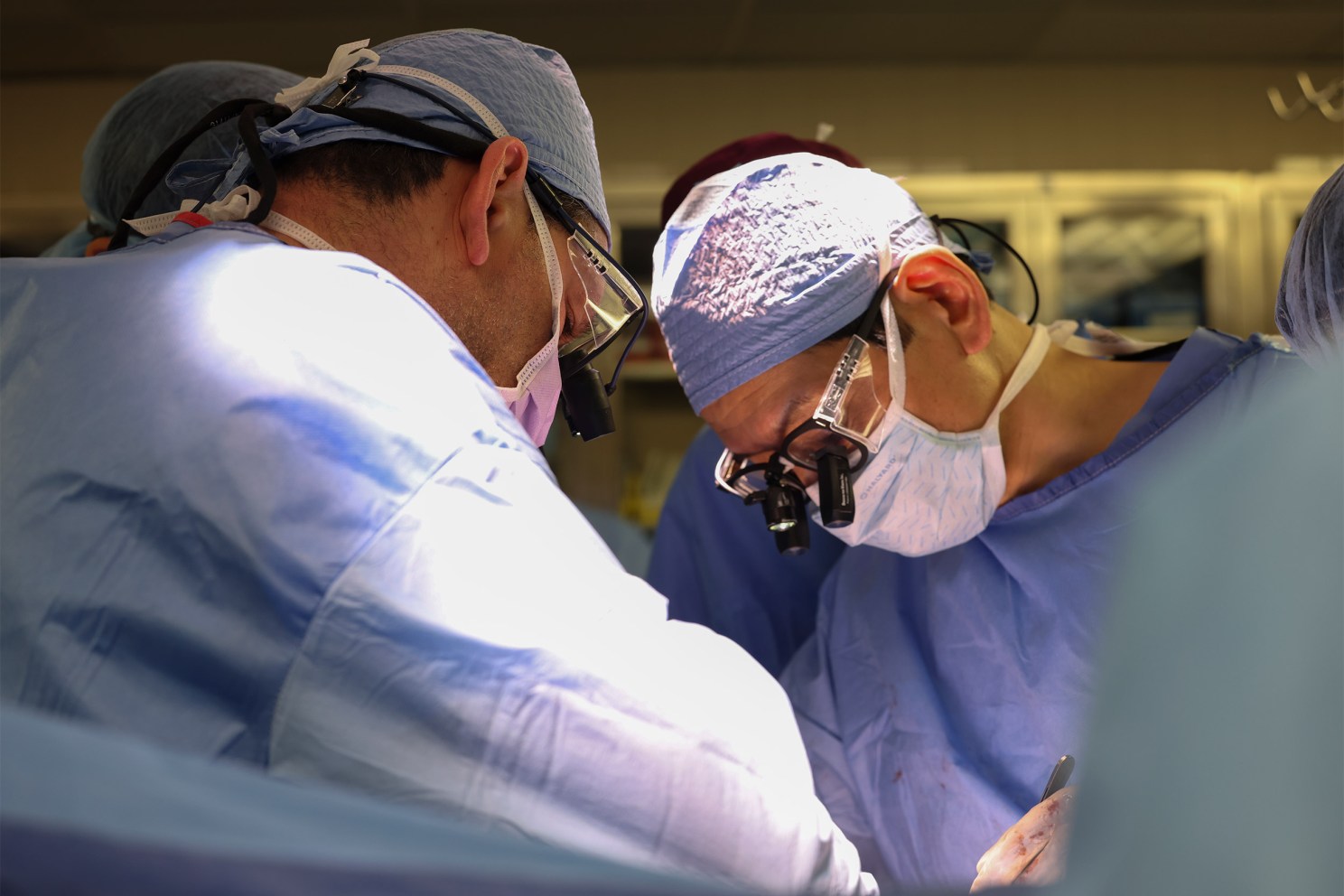First-ever transplant of pig kidney to patient a success

Mass General surgeons Nahel Elias (left) and Tatsuo Kawai performing the transplant.
Credit: Massachusetts General Hospital
Genetic editing improves compatibility, marks advance in organ shortage crisis
The world’s first successful transplant of a genetically edited pig kidney into a 62-year-old man living with end-stage kidney disease was announced by Harvard-affiliated Massachusetts General Hospital on Thursday.
Surgeons from the Mass General Transplant Center conducted the four-hour-long surgery on March 16. The procedure marks a major milestone in the quest to provide more readily available organs to patients.
“The success of this transplant is the culmination of efforts by thousands of scientists and physicians over several decades,” said Tatsuo Kawai, the director of the Legorreta Center for Clinical Transplant Tolerance and a professor of surgery at Harvard Medical School. “Our hope is that this transplant approach will offer a lifeline to millions of patients worldwide who are suffering from kidney failure.”
The pig kidney was provided by eGenesis of Cambridge, Massachusetts, which had used CRISPR-Cas9 technology to remove harmful pig genes and add certain human genes to improve its compatibility with humans. Additionally, scientists inactivated porcine endogenous retroviruses in the pig donor to eliminate any risk of infection in humans.
The patient, Richard “Rick” Slayman of Weymouth, Massachusetts, is recovering at MGH and expected to be discharged soon, according to hospital officials.
“As the global medical community celebrates this monumental achievement, Mr. Slayman becomes a beacon of hope for countless individuals suffering from end-stage renal disease and opens a new frontier in organ transplantation,” said Joren C. Madsen, director of the MGH Transplant Center and the Paul S. Russell/Warner-Lambert Professor of Surgery at HMS.
“I saw it not only as a way to help me, but a way to provide hope for the thousands of people who need a transplant to survive.”
Richard “Rick” Slayman, kidney recipient
Slayman, who has been living with Type 2 diabetes and hypertension for many years. After being on dialysis seven years prior, he received a kidney transplant from a human deceased donor in December 2018. The transplanted kidney showed signs of failure approximately five years later and Slayman resumed dialysis in May 2023. Since resuming dialysis, he encountered recurrent dialysis vascular access complications requiring visits to the hospital every two weeks for de-clotting and surgical revisions, significantly impacting his quality of life and a common problem among dialysis patients.
“I have been a Mass General Transplant Center patient for 11 years and have the highest level of trust in the doctors, nurses, and clinical staff who have cared for me,” Slayman said in a statement. “When my transplanted kidney began failing in 2023, I again trusted my care team at MGH to meet my goals of not just improving my quality of life but extending it. My nephrologist, Dr. Winfred Williams, and the Transplant Center team suggested a pig kidney transplant, carefully explaining the pros and cons of this procedure. I saw it not only as a way to help me, but a way to provide hope for the thousands of people who need a transplant to survive.”
“At MGH alone, there are over 1,400 patients on the waiting list for a kidney transplant. Some of these patients will unfortunately die or get too sick to be transplanted due to the long waiting time on dialysis. I am firmly convinced that xenotransplantation represents a promising solution to the organ shortage crisis,” said Leonardo V. Riella, medical director for kidney transplantation and the Harold and Ellen Danser Associate Professor of Surgery at HMS
The world’s first successful human organ transplant (kidney) was performed at Brigham and Women’s Hospital in 1954 and the nation’s first penile transplant, performed at MGH in 2016. According to the United Network for Organ Sharing, more than 100,000 people in the U.S. await an organ for transplant and 17 people die each day waiting for an organ. A kidney is the most common organ needed for transplant, and end-stage kidney disease rates are estimated to increase 29-68 percent in the U.S. by 2030, according to literature published in the Journal of the American Society of Nephrology.
“The continued success of this groundbreaking kidney transplant represents a true milestone in the field of transplantation. It also represents a potential breakthrough in solving one of the more intractable problems in our field, that being unequal access for ethnic minority patients to the opportunity for kidney transplants due to the extreme donor organ shortage and other system-based barriers,” said nephrologist Winfred Williams, associate professor of medicine at HMS. “This health disparity has been the target of many national policy initiatives for over 30 years, with only limited success. An abundant supply of organs resulting from this technological advance may go far to finally achieve health equity and offer the best solution to kidney failure — a well-functioning kidney — to all patients in need.”






